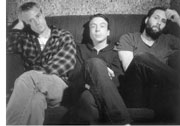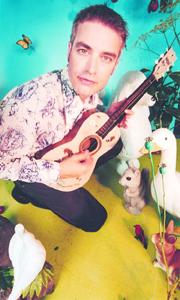BUILT TO SPILL
Showbox, 628-3151, $15 adv. 6 p.m. Thu., June 28 (all ages) 8 p.m. Fri.-Sat., June 29-30 (21 and over)
DOUG MARTSCH may live in a nice house in a quaint tree-lined neighborhood of Boise with his wife and son, but he’s still intricately connected to Seattle and its music scene. Back in the late ’80s, when he was just 19, the guitarist joined his older bandmates in Treepeople, moving here from Idaho in time for this city’s brief run as the world’s pop culture capital. Strangely, as he freely admits, he was off on the sidelines.
“We weren’t any part of Sub Pop’s scene,” Doug says of Treepeople, which released records on C/Z. “We were part of a different scene. I was marginally interested in grunge. There were a few grunge bands I liked all right. Tad was a friend because he was from Boise. We played a few shows with him. Mostly we hooked up with the punk-rock, kind of straight-edge all-ages scene, like kids from Bremerton and Tri-Cities. We played shows with Christ on a Crutch and Subvert, and the Gits later on. That, to me, was the Seattle music scene.”
Doug and I are sitting in the silo-like structure that houses his studio and practice room in his backyard, chatting about Built To Spill’s new Warner Bros. release, Ancient Melodies of the Future, when talk shifts to his early career and his continuing influence on young Pacific Northwest musicians. Now 31, he’s accepting of his role as a sort of elder statesman but unwilling to throw off his modesty. Before I can finish naming the bands who’ve credited him as an inspiration—Modest Mouse, 764-HERO, Death Cab for Cutie—he cuts in.
“That’s just the natural course. In a way, it’s flattering because I love those bands, and I think it’s really cool that one of my favorite bands in the world was influenced by us. All that means is that we happen to be the band. I don’t believe that I’m responsible for any of their talent or ideas. Basically, I got things from the Replacements and Dinosaur [Jr.], because that’s what I listened to when I was young. They lived in the Northwest, where it happened to be the age that Treepeople and Built To Spill were around.”
DOUG NEVER SET OUT to distinguish himself, but that makes sense; it’s usually the quiet, unpretentious people who make the deepest impact. After releasing Treepeople’s third album, 1993’s Just Kidding, Doug moved back to Boise and began recording under the name Built To Spill. Those first songs came out on C/Z as Ultimate Alternative Wavers, but it’s what came next that established Doug as a songwriting hero.
The late Chris Takino once told me the story of how he played a copy of Built To Spill’s unreleased second album for Sub Pop’s Jonathan Poneman, and Poneman encouraged Takino to start his own label and release it. He took the advice, forming Up Records and releasing There’s Nothing Wrong With Love, an album of buzzing pop songs about growing up, dealing with family, and the first traces of romance.
The 1994 album didn’t transform Built To Spill into a Nirvanalike touchstone or start a revolution, but it sparked a minor resurgence of Northwest indie rock, further intensified by that year’s release of another Martsch-related project, the Halo Benders’ God Don’t Make No Junk. Like his friend and collaborator in the Halo Benders, K Records’ Calvin Johnson, Doug didn’t attempt to upgrade his regional prominence into national fame.
Eventually, though, Doug would step up to a major label, signing with Warner Bros. and enlisting drummer Scott Plouf and bassist Brett Nelson to round out the core band. Ancient Melodies, the third studio album for Warners and the follow-up to last year’s sprawling concert disc Live, revisits the sort of simple, honest songwriting that made There’s Nothing Wrong With Love such a favorite.
DOUG DOESN’T have much to say about it, but when pressed about why he’s opted to tip the scales back to three-minute pop tunes rather than the seven-minute epics that prevailed on 1997’s Perfect From Now On and (to a lesser extent) 1999’s Keep It Like a Secret, he fesses up. “I did make a conscious decision to keep things short. I wanted it to be like an old record, like 35 minutes. I think it ended up being 40. Other than that, I treat songs as individual songs and try to make each song sound as good as possible.”
That included enlisting Sam Coomes of Quasi to pound the Roxichord organ on the opening track, “Strange.” That in itself is strange, because it goes against conventional wisdom to start an album with a sound attributable to another band. But this is Doug Martsch we’re talking about.
This is the man who books three-night stands in cities like Seattle, New York, San Francisco—often making sure at least one is all-ages (like Thursday’s gig at the Showbox). Why not take the money and run? “You don’t have to drive. You don’t have to set up your gear and sound check. You have all day to mess around,” he says economically. For this tour, Built To Spill have practiced a wider range of songs than usual, so they can play varied sets each night.
That’s probably about as much change as Doug can stand. Everything else remains the same—Seattle’s Phil Ek produced Ancient Melodies, as he’s done with all but the first Built To Spill disc; Caustic Resin’s Brett Netson will play rhythm and lead guitar alongside Doug on stage; and Seattle’s the Delusions will open the entire tour.
Why not pick a high-profile band to travel with, in hopes of bringing in a vast audience? “Because I wanna hang out with them, because I love their music,” Doug says of the Delusions, sounding shocked that I’d ask. “They’re a band that bring me to tears. I love them.”
Ask most young Pacific Northwest rock musicians how they feel about Built To Spill, and you’ll probably hear a similar refrain.






